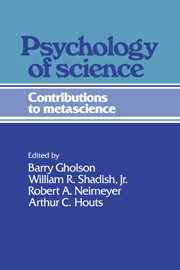Book contents
- Frontmatter
- Contents
- Preface
- Contributors
- 1 The psychology of science: An introduction
- Part I Historical issues in the psychology of science
- Part II The case for a psychology of science
- Part III Creativity and the psychology of science
- Part IV Cognition in the psychology of science
- Part V Social factors in the psychology of science
- Part VI Epilogue and Prologue
- Author index
- Subject index
Part V - Social factors in the psychology of science
The social psychology of science
Published online by Cambridge University Press: 05 June 2012
- Frontmatter
- Contents
- Preface
- Contributors
- 1 The psychology of science: An introduction
- Part I Historical issues in the psychology of science
- Part II The case for a psychology of science
- Part III Creativity and the psychology of science
- Part IV Cognition in the psychology of science
- Part V Social factors in the psychology of science
- Part VI Epilogue and Prologue
- Author index
- Subject index
Summary
If one were to examine only the titles of the foregoing chapters, with their emphasis on cognition, creativity, and imagery, one might conclude that the central processes in science are highly individual or subjective. From this intrapersonal perspective, psychology as the “science of mental life” is clearly relevant to metascience, insofar as it offers a set of theories, methods, and strategies for studying such private processes in a public and disciplined way.
But on closer reading, many of the previous chapters also point toward the implicit social context of these individual processes, suggesting their ultimate inseparability from the social dimensions of scientific discovery, theory development, and knowledge certification. From this more interpersonal perspective, psychology defined as a broader “science of human behavior” might make an equal contribution to science studies. Examples inviting this kind of social-psychological analysis include the often powerful pressures toward conformity described by Mahoney (Chapter 6), the social factors that influence discovery alluded to by Tweney (Chapter 13), and the communal processes for knowledge selection and retention identified by Simonton (Chapter 7). The chapters in this section extend two of the primary research fronts in this growing social-psychological literature: (1) the study of scientific collaboration, and (2) the investigation of judgment processes affecting the evaluation of scientific work. The first of these areas builds upon the extensive efforts of sociologists, who have examined scientific communication and coauthorship patterns to identify cohesive invisible colleges and theory groups (e.g., Crane, 1972; Mullins, 1973).
- Type
- Chapter
- Information
- Psychology of ScienceContributions to Metascience, pp. 367 - 369Publisher: Cambridge University PressPrint publication year: 1989

